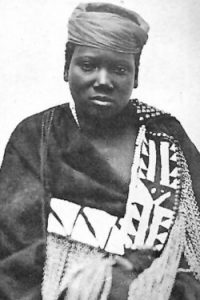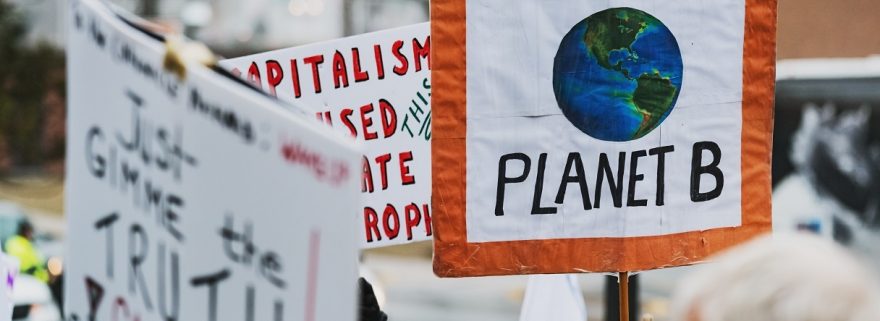Greta Thunberg and Nongqawuse: Two sixteen-year-old women challenging the world
Greta Thunberg reminds me of Nongqawuse who, also at the age of sixteen, initiated a movement that attempted to drive white settlers out of nineteenth-century South-Africa.
On 23 September 2019, Thunberg spoke at the UN Climate Action Summit in New York. Her passionate call for action was covered by media all over the world. She told the assembled world leaders:

A sixteen-year-old woman with a prophecy
Greta Thunberg needs no introduction, as we are familiar with how she has become central to a global movement where mainly youngsters make a forceful plea to save the planet and their future from environmental degradation. But Nongqawuse is not so well known.
Nongqawuse was born in 1841 in what was then known as Xhosaland, in today’s Eastern Cape Province, South Africa. As she grew up, colonial forces were destroying her society. British soldiers and white settlers stole land and cattle, and many Xhosa died during colonial wars, including her parents. Colonization introduced illnesses that very likely led to a further decimation of cattle. For the Xhosa, cattle was not only an important source of nutrition, it also functioned as a kind of currency that maintained social relations and identities through marriage, initiation, funerals and other rituals. Therefore, the decimation of cattle led to hunger but also threatened the social fabric of society. The world as Nongqawuse and her contemporaries knew it was being destroyed and the Xhosa leaders were powerless against these colonial forces.
Restoring the world
At the age of fifteen, Nongqawuse was scaring away birds from her uncle’s field when she received an invocation from ancestral spirits. The spirits professed that they would sweep the white settlers back into the sea and restore the land and cattle. But in order to make this happen, the Xhosa people had to destroy all their crops and kill their cattle. Only then the dead would arise. Nongqawuse shared the invocation with Xhosa leaders and, although some remained highly skeptical, people listened and acted upon the prophecy.
Leaders reclaiming authority
Of course there are plenty of differences between Nongqawuse’s response to nineteenth century colonialism and Greta Thunberg’s activism against environmental threat. Yet the similarities between the two women’s actions speak to the experience of crisis and today’s political moment and movement – and one could add women like Joan of Arc and Alice Auma to this list. When people experience a crisis that threatens their economic prospects, this crisis may fundamentally put into question their essential beliefs and commonly held ideas about the future, about land and animals, and about the ability of leaders to stop this crisis. The world is no longer as one knows it. Suddenly, and dramatically, a movement emerges in which a sixteen-year-old woman takes center stage. This exposes the impotence of a society’s leaders, both then and now mostly old men. The movement knows a way out and this requires a radical break from the past. The leaders are divided about what to do but are unable to ignore a message from someone who in so many ways speaks from the margin. They have to show they are in control of the situation, even when they are not. They have to do something to regain their authority.
Back to the 19th century
Back to the Xhosa cattle killing movement of 1856-7. The leaders of Nongqawuse’s society told people to act and between 300.000 and 400.000 cattle were killed while vast amounts of crops were destroyed. But the ancestors did not keep their promise. It is estimated that as a result of the cattle killing about 70,000 people died from famine while it left survivors even more exposed to colonial exploitation. The white settlers did not disappear either. Even such drastic measures could not to change the tide.
What can history teach us?
Does this mean that we can learn from the past? One could draw many conclusions, for example that global capitalism continues to destroy societies and that the leaders of the world do not have the power or the will to stop this; or that drastic measures have unforeseen consequences, some of which can be very destructive. Devoted climate change deniers might want to conclude that we should not listen to Greta Thunberg. But history usually does not teach us these kinds of lessons. Instead, it shows us how suddenly new ways of seeing the world can emerge. Views about what needs to be done can change unexpectedly when people are faced with a crisis that not only threatens their livelihoods but also their relations and the way they give meaning to their lives. The lesson that history does teach us is that we are facing tremendous uncertainty about the future for ourselves and our children, but also uncertainty about whether our institutions can solve this crisis. It shows how a sixteen-year-old woman, who is in so many ways the opposite of these powerful men and their institutions, can suddenly become important to a movement and show that commonly held worldviews have changed.



0 Comments
Add a comment